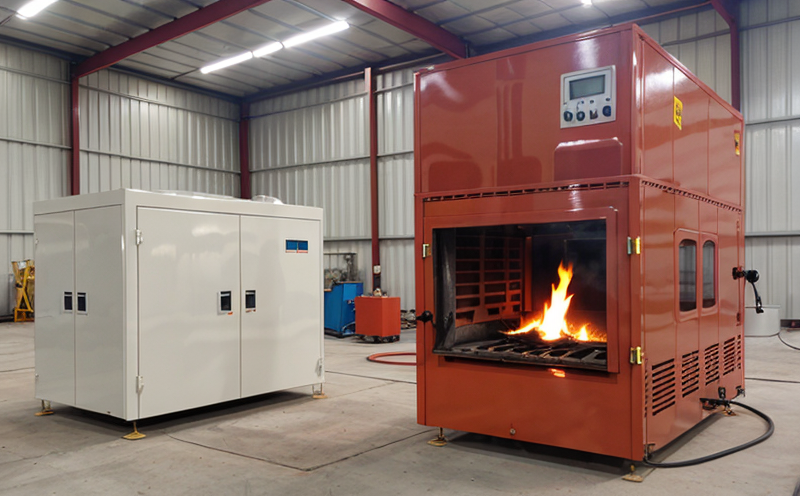ISO 11358 Thermogravimetric Analysis (TGA) of Polymers
The ISO 11358 standard specifies the procedure for performing thermogravimetric analysis (TGA), a technique used to study how the mass of a sample changes with temperature. This service is particularly valuable in metallurgy and material testing, especially when dealing with polymers, as it can provide insights into thermal stability, decomposition behavior, and phase transitions.
Thermogravimetric analysis involves heating a sample at a controlled rate while measuring the mass change over time. This method helps in understanding various aspects of polymer behavior under heat stress conditions, which are critical for quality assurance and development in metallurgy applications such as coatings, composites, and structural materials.
Polymers used in these sectors often undergo significant thermal degradation during processing or service life. By employing ISO 11358 TGA, we can determine the precise temperature at which weight loss occurs, thereby identifying critical process parameters and optimizing manufacturing techniques to enhance product performance.
The testing procedure involves precise sample preparation, typically involving a small, accurately weighed portion of the polymer sample. The sample is then subjected to a controlled heating rate in an inert atmosphere or under specific conditions relevant to the application domain. This ensures that any observed weight changes are due solely to thermal effects and not atmospheric interactions.
The results from this analysis can be used to establish critical processing temperatures, improve formulation of additives, and set standards for quality control. Additionally, TGA data provides valuable information on the thermal stability of materials, helping to predict their service life under various operating conditions. This is particularly important in sectors where temperature cycling is a factor.
The application of ISO 11358 TGA in metallurgy and material testing contributes significantly to ensuring that materials used in these industries meet strict quality standards and regulatory requirements. It allows for the optimization of production processes, reducing waste and improving efficiency. Moreover, it aids in the development of new materials with enhanced thermal stability and durability.
Our experienced team ensures that all tests are conducted under stringent quality control measures to guarantee accurate results. We use state-of-the-art equipment calibrated according to ISO standards to ensure precise measurements. Our methodologies align closely with international guidelines, ensuring consistency and reliability in our findings.
Applied Standards
| Standard Code | Description |
|---|---|
| ISO 11358-1:2010 | General requirements and methods for thermogravimetric analysis of solids. |
| ASTM E934-17a | Standard practice for thermogravimetric analysis of polymers. |
| EN ISO 18056:2016 | Thermogravimetric analysis - Particular methods and applications. |
Scope and Methodology
The scope of this service includes the comprehensive evaluation of polymers using TGA according to ISO 11358-1:2010. The methodology involves precise sample preparation, loading into a TGA instrument, and conducting tests under controlled atmospheric conditions. We follow strict protocols to ensure that all variables are accounted for, providing reliable data on thermal stability.
The testing process begins with obtaining an accurate weight of the polymer sample. This is followed by placing the sample in a crucible or similar vessel suitable for TGA analysis. The crucible is then placed into the furnace of the TGA instrument, which heats the sample at a controlled rate. Throughout the heating process, mass changes are continuously monitored and recorded.
The results provide detailed insights into how the polymer responds to heat, including any decomposition or phase transitions that occur. This information can be used to refine manufacturing processes, optimize product design, and ensure compliance with industry standards. Our team works closely with clients to interpret these findings in the context of their specific applications.
We also provide detailed reports that include all relevant data points from the TGA analysis, along with recommendations for improving material performance based on our findings. These reports are tailored to meet the needs of quality managers, compliance officers, R&D engineers, and procurement professionals who require such information for decision-making purposes.
Quality and Reliability Assurance
We take pride in maintaining high standards of quality and reliability in all our services. For ISO 11358 TGA testing, we employ advanced instrumentation calibrated to meet the stringent requirements set out by international standards bodies like ISO, ASTM, and EN.
Our team consists of experienced professionals who are well-versed in both the theoretical aspects of thermogravimetric analysis as well as practical applications. They ensure that each test is conducted meticulously, following established protocols to minimize errors and variability.
We maintain comprehensive documentation throughout the testing process, ensuring traceability and transparency. This includes detailed records of sample preparation, atmospheric conditions during testing, heating rates used, and all observed mass changes. These records are essential for validating results and supporting any claims made based on our findings.
Regular calibration checks are conducted to keep our equipment functioning at optimal levels. Additionally, we participate in proficiency testing programs recognized by regulatory authorities to further demonstrate the reliability of our services. Compliance with these stringent quality control measures ensures that clients receive consistent, high-quality results every time they use our ISO 11358 TGA service.
Our commitment to excellence extends beyond just meeting current standards; we actively participate in ongoing research and development efforts aimed at improving the accuracy and applicability of thermogravimetric analysis techniques. This proactive approach allows us to stay ahead of industry trends and provide cutting-edge solutions tailored specifically for our clients' needs.





